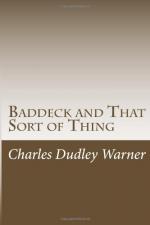Though the question was unexpected, and I had never thought before whether I could read or not, I confessed that I could probably make out the meaning, and took the newspaper. The report of the fire “near Boston” turned out to be the old news of the conflagration in Portland, Oregon!
Disposed to devote a portion of this Sunday to the reformation of this lively criminal, I continued the conversation with him. It seemed that he had been in jail before, and was not unaccustomed to the life. He was not often lonesome; he had his workbench and newspapers, and it was a quiet place; on the whole, he enjoyed it, and should rather regret it when his time was up, a month from then.
Had he any family?
“Oh, yes. When the census was round, I contributed more to it than anybody in town. Got a wife and eleven children.”
“Well, don’t you think it would pay best to be honest, and live with your family, out of jail? You surely never had anything but trouble from dishonesty.”
“That’s about so, boss. I mean to go on the square after this. But, you see,” and here he began to speak confidentially, “things are fixed about so in this world, and a man’s got to live his life. I tell you how it was. It all came about from a woman. I was a carpenter, had a good trade, and went down to St. Peter’s to work. There I got acquainted with a Frenchwoman,—you know what Frenchwomen are,—and I had to marry her. The fact is, she was rather low family; not so very low, you know, but not so good as mine. Well, I wanted to go to Boston to work at my trade, but she wouldn’t go; and I went, but she would n’t come to me, so in two or three years I came back. A man can’t help himself, you know, when he gets in with a woman, especially a Frenchwoman. Things did n’t go very well, and never have. I can’t make much out of it, but I reckon a man ’s got to live his life. Ain’t that about so?”
“Perhaps so. But you’d better try to mend matters when you get out. Won’t it seem rather good to get out and see your wife and family again?”
“I don’t know. I have peace here.”
The question of his liberty seemed rather to depress this cheerful and vivacious philosopher, and I wondered what the woman could be from whose companionship the man chose to be protected by jail-bolts. I asked the landlord about her, and his reply was descriptive and sufficient. He only said,
“She’s a yelper.”
Besides the church and the jail there are no public institutions in Baddeck to see on Sunday, or on any other day; but it has very good schools, and the examination-papers of Maud and her elder sister would do credit to Boston scholars even. You would not say that the place was stuffed with books, or overrun by lecturers, but it is an orderly, Sabbath-keeping, fairly intelligent town. Book-agents visit it with other commercial travelers, but the flood of knowledge, which is said to be the beginning of sorrow, is hardly turned in that direction yet. I heard of a feeble lecture-course in Halifax, supplied by local celebrities, some of them from St. John; but so far as I can see, this is a virgin field for the platform philosophers under whose instructions we have become the well-informed people we are.




